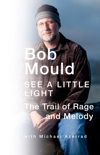
This is an obvious must-read for anyone interested in punk rock: the story of the main force behind one of the top five American punk bands, Hüsker Dü. And though by page 150 Hüsker Dü has broken up, there's a lot of interesting stuff after that. By which I don't just mean his also excellent band Sugar, his solo albums, etc. More than most music bios, this is the story of a man whose job just happens to be "musician."
That's not to say that it's an entertaining book full of uproarious anecdotes like Keith Richards's autobiography. This book lacks that sort of celebrity dazzle and charm; Mould's wit is dark and wry (such as his memory of a Finnish festival performance where he "saw an inebriated local approach one of the festival agents and, mistaking him for a tree, began to urinate on his leg") rather than sparkling and exuberant. But in a way it's much more satisfying: One never gets the sense that Richards has matured or learned any life lessons (junkie business doesn't count), whereas Mould's autobiography strongly focuses on the developmental trajectory of a man coming to terms with himself and conquering his faults. So while it's a bit disappointing that Mould spends relatively little time talking about the construction of his music -- its lyrics, equipment, and influences, yes, but almost nothing about the actual notes -- his long voyage of self-discovery is downright uplifting.
It starts with the dysfunctional family he grew up in, which already had made him a heavy drinker in his teens; then at college he begins indulging in drugs. Some of his musical relationships turned dysfunctional as well; his drinking escalated. He had to come to terms with his homosexuality, a long, gradual adjustment that eventually made him happier as he concurrently gave up some of his bad habits.
There are times when the music geek in me wishes there had been a little more detail injected into the narrative. For instance, Mould used cellist Jane Scarpantoni on his first solo album. How did he hear about her? It's mentioned that she'd recently contributed to R.E.M.'s Green album; is that a hint at the connection, or just an interjected factoid? We're not told. It's then mentioned that she later recorded with "many notable artists, including Nirvana, Sheryl Crow, and Bruce Springsteen," but to NY-area music fans she was already a familiar name before she'd recorded with R.E.M. -- to the sort of reader this book will attract, it would be more interesting to know that by the time Mould used her, she'd already been a member of the band Tiny Lights and collaborated with ex-Bongos frontman Richard Barone, notably on his cult-favorite live album/solo debut Cool Blue Halo.
There's still plenty of "inside baseball" info, though: that Mould's theme music for the Daily Show was an outtake from his third solo album; that the guitar sound of Sugar's debut LP Copper Blue was flavored by Kevin Shields's style in My Bloody Valentine, while the songwriting was sometimes influenced by Bob's love of Cheap Trick. There is also the avowal that though Bob is gay and Hüsker Dü bandmate Grant Hart is bi, they never got involved -- which contradicts the rumor that went around when Hart's EP 2541 was released which said that it was about their romantic breakup. And it's interesting to learn which songs Mould thinks are good and which he now disdains, although sometimes it seems that extramusical considerations enter into that equation.
Since Azerrad covered Hüsker Dü in depth in his seminal book on indie rock, Our Band Could Be Your Life, and has been a respected rock journalist for over two decades, one goes through See a Little Light with the reassuring sense that he was well equipped to call Mould on any biz BS. There are no obvious distinctions between his voice and Mould's, however; the authorial voice is pretty seamless, though I did occasionally, with my own rock crit/editor radar, suspect that various elucidating facts sprinkled among the musical topics came from Azerrad. Also, there was a structural decision that I think worked out very well. Though the narrative is largely chronological, there are some crucial exceptions; a few topics, such as Mould's interest in and eventual involvement in pro wrestling (and a more important personal event I'll leave for readers to discover), are dealt with contiguously instead of being spread out in bits and pieces.
There are a lot of biographies and autobiographies of musical icons, often rather slapdash and/or trivial. This is neither; it is a carefully considered, thoughtfully constructed, and emotionally fulfilling look at one man's fascinating life. Even people who aren't fans of underground rock, should they take a chance on it, will find it an excellent example of autobiography, not merely of "musical autobiography."
